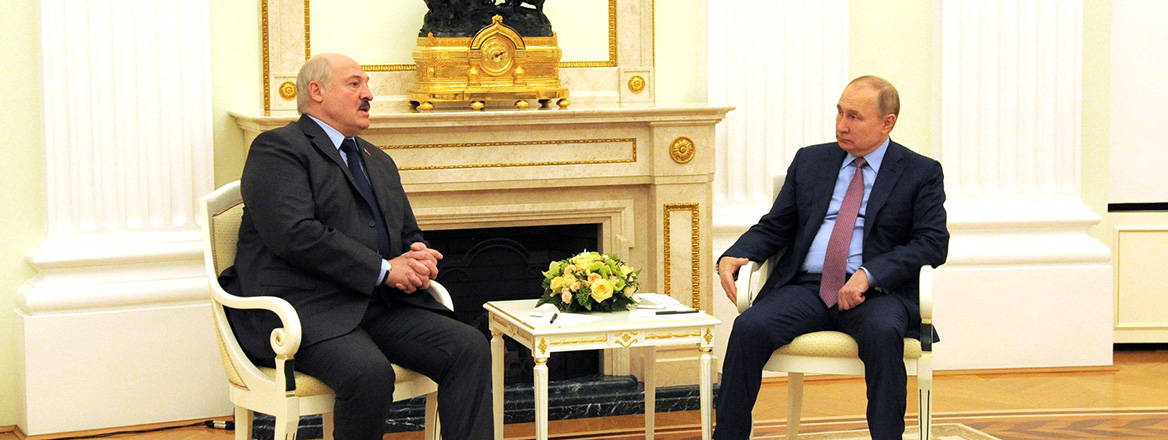Putin’s invasion of Ukraine has highlighted a political shift in Belarus as Russia tightens its grip on its key regional ally.
In a fast-paced conflict that changes hourly, it is worth considering what the war in Ukraine has revealed – or confirmed – about Russia’s strategic interests towards some of its closest allies. Notwithstanding previous talk of Belarus’s state sovereignty, it is now clear that President Vladimir Putin intends for his neighbour to become an entirely subordinate client state.
While this war has changed the way in which many analysts frame Russia, it has also altered Belarus’s own security status, particularly as part of Russia’s strategic thinking. The way in which Belarusian President Alexander Lukashenko navigates this new role is likely to dictate his own political future.
Uncomfortable Bedfellows
Putin and Lukashenko do not get along. Their personal relationship is known to be poor, exacerbated by Belarus’s initial criticism of the 2014 annexation of Crimea, followed by its hosting of the Minsk agreements since 2015. A series of other spats between Russia and Belarus have ensued since, including disagreements over oil taxes, Lukashenko’s periodic snubbing of important economic summits, and an obtrusive Russian ambassador to Belarus who overreached and attempted to interfere in Belarusian domestic affairs. In the case of the latter, and as a signal of slight conciliation towards Belarus, Moscow recalled him.
For years, Lukashenko had vocally resisted Russia’s attempts to bring Belarus closer into its orbit, carefully holding Moscow at arm’s length while receiving significant subsidies to prop up Belarus’s ailing economy. He was also able to deftly balance this with a burgeoning relationship with the EU, which oscillated between criticism of Belarus’s human rights violations and proposals for greater European investment there.
Putin has cast himself as the gatekeeper of Russia’s national interests, in which Belarus, Russia and Ukraine are an inextricable ancient trinity united by centuries-old ties
When Putin resumed the presidency for a third term in 2018, the Kremlin began a renewed campaign to promote the Union State – the formalisation of an existing framework agreement between Belarus and Russia that meant little in practice. This caused some consternation from Lukashenko, who repeatedly maintained that deeper economic and military integration with Russia would threaten Belarus’s sovereignty, concerned (rightly) that Belarus would become entirely subsumed into Russia’s economic and security structures. One of the main sticking points in the agreements had always been Russia’s intention to establish a military base on Belarusian territory, a red line that Lukashenko made clear he would never cross.
While it was tempting in 2018 to dismiss talk of the Union State, it soon became clear that Russia’s intentions were real. Progress on the Union State ramped up after the Belarusian presidential elections in August 2020, which saw large protests in Minsk following Lukashenko’s resumption of power. At the time, Russia’s response to the protests was to wait, just in case. Once it became certain that Lukashenko’s security apparatus was able to violently quell demonstrators, and that the threats to his office were dismissed or exiled, Russia resumed talks in earnest. The promotion in March 2021 of Dmitry Mezentsev to Secretary of the Union State was another indication that Russia was serious about this. Mezentsev was Russia’s ambassador to Belarus – whose predecessor Mikhail Babich had been recalled – and had played an important role in smoothing over some of the diplomatic strain that Babich’s tenure had caused.
Lukashenko’s One-Eighty
But then something changed. Following a series of meetings with Putin throughout 2021 to discuss the Union State, it appeared that Lukashenko’s attitude was altogether different. Suddenly, in November 2021, in a Russian TV interview with Dmitry Solovyev, he claimed that he did recognise Crimea’s annexation, a complete departure from his previous convictions. That same month, Putin and Lukashenko signed a new security doctrine, details of which were only published on the Union State’s website in February 2022. That document fundamentally altered Belarus’s national security status, from a previously ‘neutral’ country with nuclear-free status, to deleting that text altogether. The amendment is vague, keeping all possibilities open, but the doctrine was clearly altered to allow Russia to launch a military offensive on northern Ukraine from Belarusian territory.
The war in Ukraine has starkly revealed in practice the importance to Russia of the Slavic Brotherhood (slavyanskoye bratstvo). Putin has cast himself as the gatekeeper of Russia’s national interests – with his own version of what that might mean – in which Belarus, Russia and Ukraine are an inextricable ancient trinity, united by their centuries-old historical, linguistic and cultural ties. This idea goes beyond mere spheres of influence and back to Ancient Rus’, the cradle of Russian civilisation. It is a concept that Putin has referred to in his articles published over the past year, with Moscow playing a central role in unifying Russia’s lands to protect them from invading armies.
Leaders like Putin and Lukashenko likely concluded from the recent protests in Kazakhstan that a smooth transition of power is not possible, and that they must hold onto it at all costs
Belarus the Broker?
Given this view of ultimate subordination to Moscow, Belarus has a limited theatre in which to operate. While permitting missiles to be fired into Ukraine from Belarusian territory, Lukashenko has at the same time offered his country as a ‘neutral’ meeting point for Ukraine and Russia to hold peace talks. But the role of peaceful negotiator does not suit Lukashenko, who only the day before threatened Ukraine with Belarus’s own ‘special operations' – the now-infamous term that Putin has used to frame the war in Ukraine – and has accused Ukraine of drawing Belarus into the conflict due to a supposed need to protect Belarusian citizens.
Lukashenko also seems unsure of his next steps, and unclear on Belarus’s role. The extent to which Belarusian troops could become embroiled in the conflict remains unknown. On 24 February, Lukashenko maintained that Belarusian troops were not involved in Ukraine, but left the door open for this to change, suggesting that Belarusian troops could be sent into Ukraine to assist the Russian forces there ‘if necessary’ – a set of conditions that are unclear.
In an attempt to claw back some agency, on 27 February Belarus held a constitutional referendum – widely viewed as a rubber-stamp vote – to approve changes that not only solidified Lukashenko’s political position until 2035, but also weakened the Belarusian parliament. Although this effectively cements political continuity in Belarus, it does not accord Lukashenko with any real power over the direction of the Union State. Indeed, his tightening of the circle of trust around himself, ensuring that politics in Belarus remains entirely personal and tied to him alone, might suggest that he has concerns about Russia’s plans for his future.
He is right to be concerned. Leaders like Putin and Lukashenko likely concluded from the January 2022 protests in Kazakhstan that a smooth transition of power is not possible, and that they must hold onto it at all costs. Russia needs some guarantee that even without Lukashenko, Belarus will remain in Moscow’s orbit. Predictable and manageable domestic politics in Belarus is useful for Putin, but its dependency on Lukashenko is problematic. Russia will be watching how Lukashenko manages this war and the extent to which he falls in line with Moscow’s worldview; his future depends on it.
The views expressed in this Commentary are the author’s, and do not represent those of RUSI or any other institution.
Have an idea for a Commentary you’d like to write for us? Send a short pitch to commentaries@rusi.org and we’ll get back to you if it fits into our research interests. Full guidelines for contributors can be found here.
WRITTEN BY
Emily Ferris
RUSI Senior Associate Fellow, International Security
- Jim McLeanMedia Relations Manager+44 (0)7917 373 069JimMc@rusi.org


